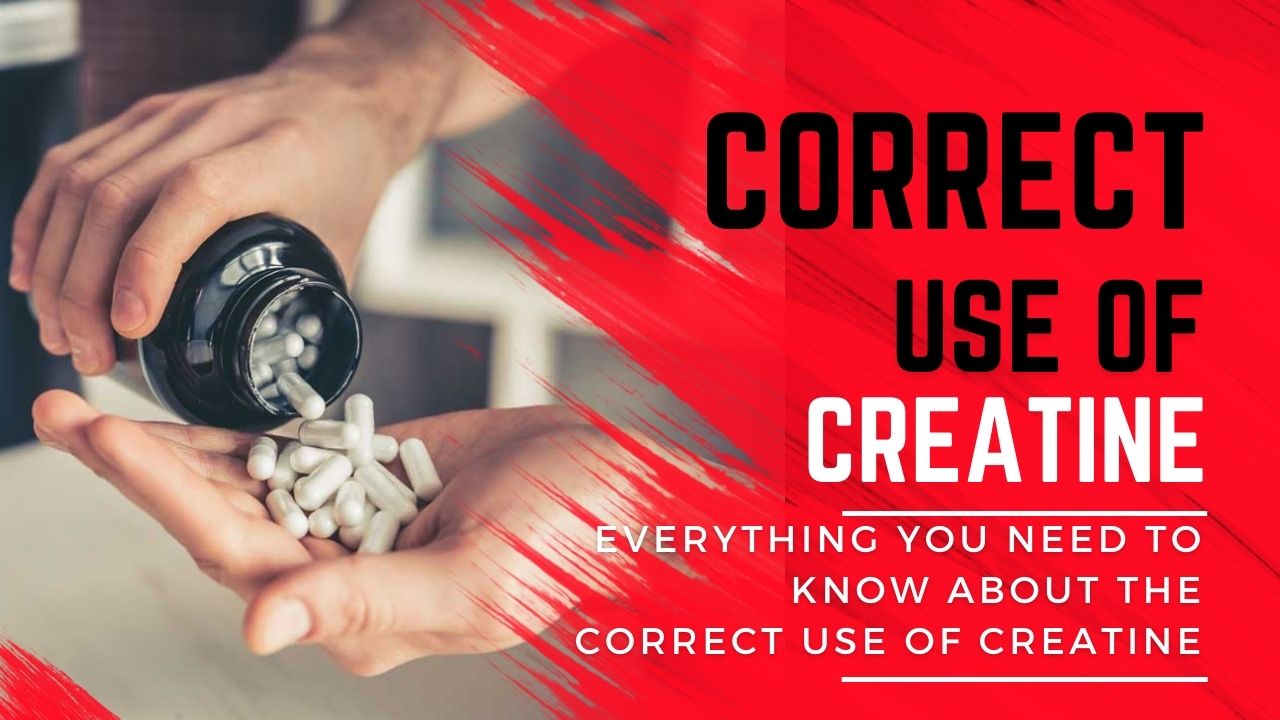Ambitious athletes can hardly avoid creatine as a dietary supplement. Creatine increases physical performance during high-speed strength training in the context of short-term, intense physical activity. Therefore it is no wonder that it is so popular. Here in this article, we explain how you can take creatine correctly and answer the following questions: What should I take creatine with? How much every day and at what time? How Long Should I Take Creatine?
What is Creatine?
Creatine (“kreas” is Greek for “meat”) is an organic acid that is produced in the pancreas, liver, and kidneys. It is produced from the amino acids methionine, arginine, and glycine. Creatine can also be supplied through food, although it is also found in small quantities in fish and meat. Creatine is stored in the body up to 140 gms, 90% of which is stored in the skeletal muscles.
Creatine provides the muscle with a high dose of energy for a few seconds, which is why it has proven itself as a dietary supplement in many sports. In high-speed strength sports such as weightlifting or sprinting, it can demonstrably increase performance in the context of short-term intensive loads (with a daily intake of 3 gms).
Furthermore, it has been proven that this daily dose of 3 g can increase the effect of strength training in people aged 55+, provided they regularly do muscle building training at least 3 times a week. Creatine is not only used by speed strength athletes and seniors, but also by athletes in countless disciplines, including endurance athletes.
Even if it has not yet been adequately researched to what extent creatine has a performance-enhancing effect in which sport, it is already known that creatine in a dose of around 3 g per day has practically no side effects and can therefore be consumed without hesitation. As part of a creatine cure, you can also take the dietary supplement for a limited period and see whether and how it works for you.
Read also: The Diet for Bodybuilders
How much creatine should you take in a day?
We recommend an intake of 3 to a maximum of 5 grams per day. The body stores creatine from food and uses it when the muscles have to work hard for a few seconds. The creatine stores are limited, and their size is also related to the existing muscle mass: the larger it is, the more creatine can be stored. Those who consume more creatine than they can store, excrete the rest unused. A 70 kg man of the average physique can store around 120 gms of creatine.
It is often recommended to start creatine intake with a five-day loading phase. During this time you should consume approx. 20-25 gms creatine per day. According to the latest findings, such a loading phase is only recommended in cases when you only want to take creatine for a very short time.
If you plan to take creatine for a few weeks or permanently, the possible disadvantages of a loading phase such as bad breath, flatulence or cramps outweigh the disadvantages. For this reason, a dosage of 3-5 gms creatine per day is recommended for many athletes from the experts. This is the amount that is otherwise recommended for the so-called “maintenance phase” that follows the loading phase. Instead of taking it permanently, there is also the option of taking breaks. You can find more about this in the ” Creatine Cure ” section.
Who wants to make sure that the onset of action as soon as possible, can also be a “loading phase light” make and g 10 days 10 creatine per day consume, before reduced to 3-5 gms. With this dosage, the risk of possible side effects remains lower than with a classic loading phase, but the stores tend to be completely replenished faster than with a dose of 3-5 g creatine per day.
How should you take creatine?
You can buy creatine as a powder and stir it into a liquid. Or you can buy it as capsules or tablets. Since in these cases, too, it is basically a (enclosed or pressed) powder, it makes no difference in which form you take creatine.
In any case, you should take it with plenty of fluids and drink plenty of water throughout the day, as creatine binds water . If you consume creatine powder , it is best to stir it into a warm, non-boiling liquid as this is how it dissolves best .
Classically, it is recommended to consume creatine together with short-chain carbohydrates (” everything that is sweet “), as these should serve as a so-called “transport matrix” into the bloodstream, which should lead the creatine to the muscle fibers more quickly. In addition, the released insulin should help with absorption. The most commonly recommended combination is creatine mixed with grape juice, which is very sugary.
This theory of better absorption is viewed critically in part. However, apart from the relatively high number of calories in the grape juice, nothing speaks against this combination. And anyone who consumes creatine on training days immediately after their workout is doing everything right with a grape juice mix anyway. Because regardless of any better creatine absorption, the grape juice quickly replenishes the glycogen stores and starts the body’s regeneration program via the release of insulin.
Can I mix creatine with egg white?
The answer is: In principle yes , you can mix creatine with protein, for example in the form of protein shakes. But since you take creatine daily, but you can do this independently of training or other appointments outside of meals, you have enough opportunities to take creatine ” alone ” .
If this question is on your mind because you take creatine after your workout for the reasons discussed above, where you normally drink your obligatory whey protein drink, then let yourself be told: Immediately after your workout, it is more important, fast carbohydrates to take in the form of grape juice as protein, because regeneration, including muscle building, is primarily stimulated by quickly filling up the empty glycogen stores and releasing insulin. The regeneration process itself then takes many hours and it is sufficient to provide the body with quickly digestible protein such as whey protein 30 minutes after the end of training.
Time of intake
When should you take creatine?
The answer is simple: the time of ingestion is not critical as the creatine is stored in each case. So you can take it at any time of the day . What is important, however, is regular daily intake. You should also take creatine on an empty stomach or at least 2 hours apart with meals so that it does not stay in the stomach too long.
Should creatine be taken before or after exercise?
With a daily intake and regular training, before training is always also after training and vice versa. In this respect, enough creatine phosphate is available for every training session. However, if you mix creatine with grape juice or other sweet drinks, you should drink this drink immediately after training in order to be able to use the sugar contained independently of the creatine intake.
Should creatine only be consumed on training days?
Under no circumstance. Creatine can only work optimally with a continuous daily intake.
When does creatine work?
In general, the best possible effect can be expected when the individual memories are filled to the maximum . If you want to make sure that this happens quickly, we recommend a dosage of 10 g creatine per day for the first 10 days (see above).
For some people, so-called “non-responders” , a dietary supplement with creatine does not work at all. One reason for this lack of reaction can be that their stores are already completely full, even without supplements. In addition, the amount of fast-twitch type 2 muscle fibers and the level of training also seem to have an influence on the success of creatine intake. If creatine doesn’t work for you, it may be worth trying out buffered creatine like Kre-Alkalyn . From time to time non-responders report that these products work for them.
You can find detailed information about the influence of creatine on muscle building and strength training in our article on creatine effects .
How long should you take creatine?
With a daily amount of 3-5 g a permanent consumption of creatine is harmless to health .
Who creatine as part of a weight training plan begins, but should consider taking after a certain time suspend . This type of creatine intake is called the creatine cure.
Why should you still take breaks in taking?
While your muscles can adapt to stress stimuli very quickly, this is a slow process for tissues such as tendons, as these are poorly supplied with blood and nutrients. The break serves primarily to regenerate and prevent injuries . During the break, it doesn’t take long for the level of your creatine stores to normalize again. On the one hand, it means that the stored water disappears from the muscles, making them less firm. However, the built-up muscles are retained .
How do I perform the creatine regimen?
A creatine cure for muscle building ( intake phase ) usually lasts between eight and twelve weeks . After that, it is advisable to take a break with a length of four to six weeks to insert. Accordingly, you can do three to five creatine regimens per year.
In the intake phase you should set the daily amount of creatine according to the loading phase and maintenance phase already described. That means in the loading phase of 5 days the daily dose is 20-25 grams, alternatively 20 grams spread over the day. The rest of the cure is spent on the maintenance phase, in which you only consume three to five grams of creatine every day after getting up or after training.
What else is there to consider when taking creatine?
Pay attention to origin and purity
It is worth paying attention to purity when buying a creatine supplement. The rule here is: “The purer the better.” In the commercially available form of creatine monohydrate, the purity should be at least 99.5%, ideally 100%. Since not all countries offer reliable manufacturing processes and controls, it is advisable to use creatine “Made in Germany”.
Keep an eye on magnesium
Creatine phosphate can bind free magnesium, which can lead to a magnesium deficiency. Cramps can be a consequence of a magnesium deficiency. If you suffer from cramps while taking creatine, an additional intake of magnesium can be useful.

